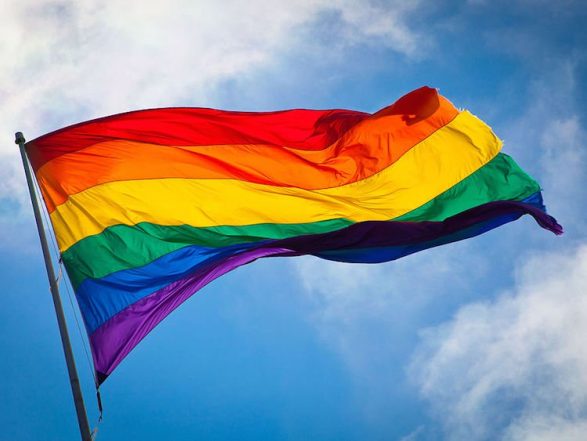
Same-Sex Marriage: Why Things Must Change In Nigeria – By Leo Igwe
–
The Guardian has once again come out against same-sex marriage in Nigeria. In its editorial of 24 April 2018, the paper argued against ‘a proposed revocation’ of the law in the country. The Guardian categorically opposed Theresa May’s directive at the just concluded Commonwealth Heads of Government Meeting in the UK that member countries should consider repealing the outdated legislation.
Unfortunately, The Guardian advanced the same worn out, opinionated and non sequitur arguments to buttress its opposition to same-sex marriage. The main thrust of their argument is: same-sex marriage is against the Nigerian culture. So the legislation should not be reviewed, revisited or revoked. This piece points out the flaws in this editorial and why Nigeria should revoke the law against same-sex marriage.
First, the editorial argued that the law against same-sex marriage reflected the norms and values of Nigerians. But the editors couldn’t spell out these norms? What is this avowed ‘Nigerian ethos’ that is opposed to the respectful treatment of gays and lesbians? The editors could not state how a marriage of people of the same sex violated such norms. The Guardian failed to provide any information on how, on the contrary, discriminating against gays and lesbians, and imprisoning same-sex loving people is in accordance with the so-called Nigerian ethos and norms.
The editorial further suggested that same-sex marriage was an affront to the traditional family structure. Incidentally, the editorial lacked information on what this ‘traditional structure’ is and how a dignified treatment of same-sex loving people constitutes a ‘continuing assault’ on family relationships. In fact, it should have been enlightening if The Guardian had outlined what they meant by traditional family setting with copious instances and references to where this family arrangement applied in Nigeria. They should have pointed out this much-cherished family formation that a respectful treatment of gays and lesbians contravened.
Furthermore, the editorial was critical of the “younger generations” and warned against their “dizzying pace” and openness to influences from the global village. The editorial also cautioned against their tragic embrace of changes in the world. Indeed the editors were correct in pointing out that not all changes should be embraced. However, they did not indicate the values and criteria that should guide the acceptance or resistance to changes. In fact, apart from vague reference culture and norms, the editors did not tell us the criteria for accepting or rejecting a revocation of outdated laws that discriminated against gays and lesbians in the country.
While the Guardian editorial acknowledged that the attitude to homosexuality is changing, at the same time, it opposed any change process that would lead to a social “acceptance” of homosexuals. So what does the Guardian stand to gain by endorsing the continued stigmatization of homosexuals? If perchance the Guardian decided not to be a part of this process of social change, then they should allow the “younger generations” to move forward and embrace a change of attitude towards homosexuals. The Guardian should not condemn, immoralize or unNigerianize them.
The editors went as far as stating that the vehement rejection and opposition to gay rights in Nigeria was a heartening sign of non-negotiability of certain values. But it is not clear how the editors knew the values that could or could not be negotiated. Culture is dynamic. That means cultural values change, cultural attitudes are constantly being ‘negotiated’ and renegotiated. In fact, what is going on globally today is a re-negotiation of attitudes towards homosexuals.
So, it was difficult to comprehend why the Guardian editorial stated that same-sex union was not part of the Nigerian value system; that it was alien to the Nigerian culture. Now, which society has same-sex unions as part of its culture? The West? Which tradition is same-sex union native to? The Guardian editors forgot that the practice of same-sex marriage was not part of the British culture. Homosexuality used to be a crime under British colonial laws. Legal recognition of same-sex marriage is a recent development in the West.
What Theresa May said at CHOGM was that anti-gay legislation and dispositions had become outdated. And that is truly the case. So the reference to re-colonization in the editorial was baseless. Re-colonization should not be used to resist and oppose important social change and legislative reforms. The former colonial power decided to repeal a discriminatory law that was introduced to its former colonies during the colonial era. And now it is urging former colonies that retained the law to revoke it. What is wrong with that? How does that amount to a recolonization? What is actually insulting is using the mantra of recolonization to oppose such a progressive step. What is actually disappointing and unfortunate is that the editors of the Guardian were unable to properly read the signs of the times and present a balanced and informed position on such a critical subject. Instead, they chose once again to endorse an outdated legislation.
The editors refused to prick the conscience of Nigerians who support this hateful legislation and provoke a much-needed public debate. Instead, the Guardian backed the wrong horse, assuming that nothing would change regarding the same-sex marriage law in Nigeria. This is not true. Something must change. In fact, a lot has changed –and is changing already in Nigeria and around the globe. Homosexuals are more socially accepted and respected today than at any other time in human history. And this trend will continue. So the legislation against same-sex marriage in Nigeria will not hold forever. The law cannot stand for too long because history is not on its side. Human rights are not on its side. The law is riding against the tide of social progress. That outdated legislation will eventually be revoked. Someday!






